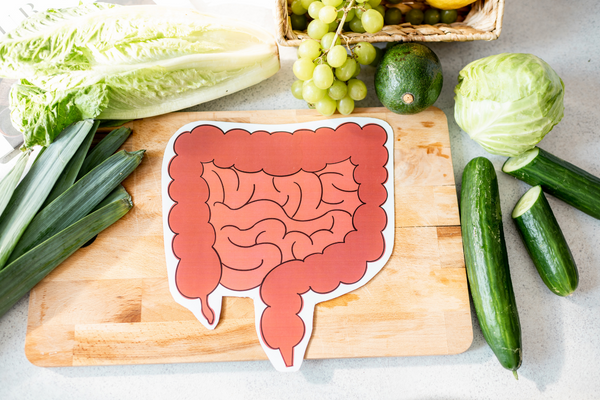Over the last ten years, research on various illnesses, conditions, and health challenges have determined your gut microbiome plays a central role in the prevention, development, and management in many cases.

Nurture a Healthy Gut
It's all the rage right now.
And for good reason, too!
Before we continue, what is the “gut?” For the purpose of our discussion, your gut is your small and large intestines. The rest of your digestive system (including your mouth, esophagus, and stomach) play definitive and important roles, but we will focus on just the “gut” for now.
Let’s review some of the fundamental reasons why paying attention to and supporting your own gut health is pivotal for your overall well-being. Here are three fundamental truths:
1. “Your gut harbors the most complex ecosystem on the planet.” We have more cells and bacteria in our gut than we do cells in our body. This ecosystem builds and tears down various essential needs for your body; it literally thinks on its own!
2. “Your gut is connected to every system in your body.” Because the gut is a central site for creation, a lot of what is transported out to various organs (especially your brain) can either support or damage your health and well-being. For example, anxiety, brain fog, skin conditions, weight challenges, energy imbalances, hormones…the list could go on and on… have all been linked to gut health. Not even just linked, but research shows that the gut is the primary health indicator.
3. “Your gut is the cornerstone of your health.” The gut is also to blame (or, hopefully thank) for our immunity. Eighty percent of your immune system resides in your gut. So, if your gut is not healthy, likely neither are you! The surest way to improve your immunity and resilience is to heal your gut!
What is the goal with gut health?
And how do we get there?
The primary goal is to support your unique microbiome in order to take care of your body. WebMD’s How Your Gut Health Affects Your Whole Body connects the way our most important defense system affects our body with a few simple terms and concepts. If you struggle with any health issues, this resource may help you find a link between your challenges and your gut.
Fortify your own microbiome!
Recommendations come from many sources- social media, commercials, medical experts, friends, family- but there are five crucial threads that unify them all. Let’s take a look at at these tips:
1. Eat fiber-rich and probiotic-packed foods. Fiber stimulates the growth and diversity of good bacteria in the gut, so choose fruits, vegetables, and whole grains. Fermented foods are also prized for their gut-boosting abilities, thanks to the presence of probiotics, which are the “worker” bacteria in your gut, helping to heal, fight, and improve the overall balance.
2. Move your body! Exercise and our body’s response to it has been shown to promote an increase in diversity of healthy bacteria, as well. Longer workouts and high-intensity aerobic training, in particular, contributed most to gut bacteria diversity and function in relation to overall wellness.
3. Reduce overall body inflammation. There are many causes of inflammation to our bodies – alcohol, certain foods, stress, lack of sleep, etc. But don’t look at that list and think you have to tackle it all at once. This should go without saying- we want you to benefit from every step you can take toward a greater overall healthy lifestyle…because every step matters, especially when you create consistency! Pick one area in which you believe you are ready to improve. Maybe you’re ready to find drink alternatives or what specific foods cause you inflammation. Maybe stress management or practicing better sleep techniques works better for you right now. A conversation with one of our certified wellness coaches can provide guidance, tools, and support as you work to reduce your inflammation!
4. Soak in sunshine and fresh air! More and more research is showing the value of some good ol’ fashion sunlight and Vitamin D. Brief exposure to the sun and fresh air can lead to a varied collection of gut bacteria – and the more variety, the more support and better functionality we receive from our gut!
5. Consider supplementation. Not all supplements are created equally. Review the Cleveland Clinic’s guide to “How to Pick the Best Probiotic.” The right supplement can give your microbiome a little boost as you begin this journey OR if you are taking an antibiotic. The latter is important because while antibiotics are designed to kill off the bad bacteria which can cause illness, they cannot differentiate between the good and the bad, resulting in reduction of the good stuff, too.
Variety + Diversity = Health
Variety is an integral part of developing and maintaining a diverse gut microbiome! Different foods encourage the addition or growth of healthy bacteria to crowd out the bad. A balance of both prebiotic and probiotic foods will support an optimal environment. The list below is just some of the foods you may consume to flavor and fortify your dietary habits. These foods also combat inflammatory ingredients such as highly processed or refined carbohydrates, added sugars, and added fats.
One way to prioritize variety, color, fiber, and health is to experiment with cultural cuisines! Asian, Greek, Indian, Korean, Mediterranean, and Mexican cuisines are made vibrant and nutrient-packed due to high vegetable, legume, and flavor content! And this is not a comprehensive list- the more you diversify and test out new recipes, restaurants, and traditions, you’ll find the right “blend” of foods that support your gut health.
Prebiotics
These are foods that feed the GOOD bacteria in your gut.
Apples, bananas
Artichokes, garlic, onions, various greens
Flaxseeds
Oats
Probiotics
These are foods that contain live microorganisms to maintain good bacteria.
Kimchi
Sauerkraut
Sourdough
Kombucha
Yogurt (Try these Plant-Based Yogurts)
Spices and herbs
Cardamom
Cinnamon
Ginger
Rosemary
Turmeric
